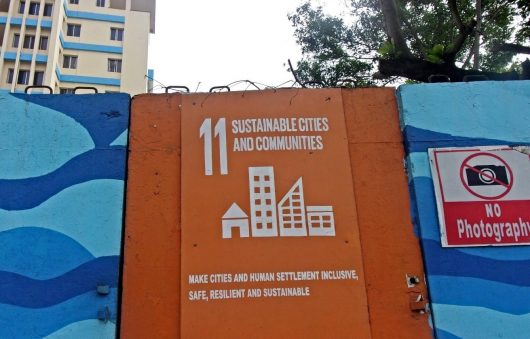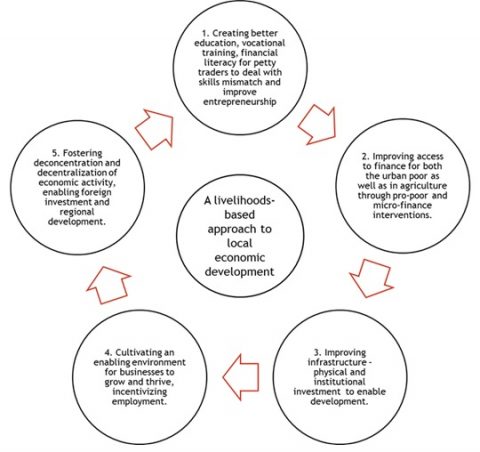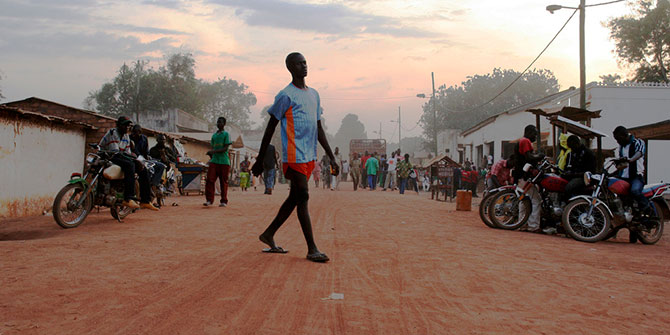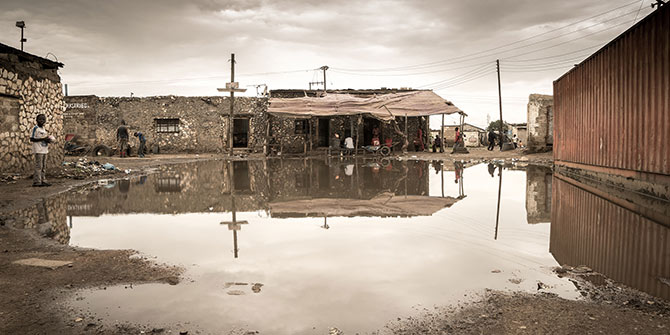Using the case of Monrovia, Liberia, LSE Geography and Environment graduate Adil Sait argues that a livelihoods-based approach to Local Economic Development has potential to transform contemporary African urban development.
Rapid urbanisation is changing development debates globally, shifting the focus of policy-makers and other actors at the city-regional scale. Across the African continent, solutions are sought that respond to the interconnected nature of urban issues. Aims of contemporary African development practice extend beyond creating economic growth; they now consider how to foster urban prosperity, environmental sustainability, social inclusion and economic competitiveness for enabling inclusive and sustainable development. Especially in contexts where histories of conflict and disaster have created a need for humanitarian assistance, looking beyond the immediacy of crises in search of development approaches that integrate these aspects is fundamental.
One such evolving approach of possible relevance to contemporary African development practice is Local Economic Development (LED). This is defined by the International Labour Organization as ‘a participatory process that encourages partnership arrangements with representatives from all sectors’, bringing together private and public stakeholders for ‘a common development strategy’. By using local resources the aim is to create ‘a resilient and sustainable city with decent jobs’ that stimulates economic activity.
With the adoption of the New Urban Agenda agreed by UN members in 2016, as a guideline for urban development, efforts have been underway to ‘redress the ways cities and human settlements are planned, designed, financed, developed, governed and managed’. Complementing the UN Sustainable Development Goals (SDGs) to make ‘cities and human settlements inclusive, safe, resilient and sustainable’, the New Urban Agenda highlights the need to support Local Economic Development interventions through strengthening multi-scalar, multi-stakeholder co-operation to improve development prospects of cities and regions.
Such approaches are especially needed in Liberia’s capital city, Monrovia, where the legacies of civil war (1989–2003) and the Ebola crisis (2014–16) have created lasting scars. In post-war Liberia, the country is made up of 70% slums and has a 68% rate of informal employment. According to the United Nations Development Programme, 86% of the population live under $1.25 per day and 83.9% live in multi-dimensional poverty. With the urban share of Liberia’s population rising rapidly from 13% in 1950 to 48.2% in 2011, the question of how to create jobs, livelihoods and employment opportunities for slum dwellers is pertinent, and connected to environmental risk, housing and access to basic services.

Following the Ebola crisis, the Monrovia City Corporation and the Ministry of Internal Affairs, invited Cities Alliance and partners from a large number of international organisations, local stakeholders, non-governmental partners, community groups and government ministries to form a dedicated programme of intervention. Together these actors formed the Liberia Country Programme (LCP) with the aim of improving the quality of life, socio-economic conditions and the inclusion of slum dwellers and the urban poor in Greater Monrovia. Its major objectives included increasing citizens’ participation in decision-making, aiding in the provision of and access to basic services to slum dwellers, and facilitating the creation of improved job opportunities.
Aligned with the Government of Liberia’s Pro-Poor Agenda for Prosperity and Development, the Liberia Country Programme created five innovations: multi-stakeholder involvement, multi-scalar innovations, multi-dimensional thinking, long-termism and capacity building. The result was a forward-looking, pragmatic and participatory agenda working across government, civil society and the community to achieve core development aims and objectives.
Conversations with Liberia Country Programme stakeholders in Monrovia – through 26 semi-structured interviews and five focus group discussions – revealed perceived challenges and opportunities. Respondents from six groupings – LCP members, non-governmental organisations, public and private sectors, local communities, and civil society organisations – confirmed academic assessments that economic development is not merely desirable but necessary to achieve better socio-economic, political and environmental outcomes. The finding also showed that the trade-offs between objectives within sustainable development can be both mediated and reconciled.
Six main themes emerged from the discussions on the perceived overarching goals of the LCP to foster longer-term development. These included making sure interventions were both inclusive and sustainable; strengthening institutions; formulating infrastructure investment and creating the enabling a suitable policy environment; reconciling differences between formality and informality in relation to both housing and jobs; and mediating between concerns over policy development, practical implementation, skills and capacity development; and funding and resource mobilisation.
The research re-emphasised the need to reappraise traditional development pathways. While economic development theorists and practitioners have long focussed on fostering industrialisation and manufacturing sector growth, without assessments of Liberia’s current context such strategies seem likely to fail.
Stakeholder interviews suggested that while there was scope for manufacturing sector growth, the scale of the development challenge could be attributed to the failure to consider the near-collapse of subsistence agriculture and the rise of petty trading; Monrovia’s growing urban population has had no access to skills training that could facilitate the creation of a larger formal economy. Due to high start-up costs and uncertainty, formal entrepreneurship and business creation in Monrovia has also been affected. These challenges in the urban economy cannot be seen in isolation: the focus should be on creating livelihoods for vulnerable populations migrating to cities affected by distortions in both the rural and informal economies resulting from rapid urbanisation.

This ‘livelihoods-based approach’ to Local Economic Development therefore emerged as a desirable approach to these development challenges. Through five integrated elements (see figure 1) the approach requires local actors and partners to address development challenges in a holistic manner to counter social and economic issues such as poverty, crime and environmental disaster risks in urban areas.
In Liberia, this approach would assist in the country’s transition from conflict to peace and prosperity and shift its development agenda from short-term targets to longer-term objectives of social and economic inclusion. The message from the LCP’s stakeholders is that only such an approach is able to realise inclusive, sustainable development in the context of Liberia’s current development challenges.
Acknowledgements: This research was made possible through funding from the Firoz Lalji Centre for Africa, as well as support from Habitat for Humanity International and the Government of Liberia through the National Housing Authority, which hosted the research stay in Monrovia, Liberia.
Main photo by EJ Yao on Unsplash





Very happy to see your article and a lot of amazing outlook
All the Best in your work assignment
Ali Sait
This is an impressive write up and has given me ideas on how i can help my city.